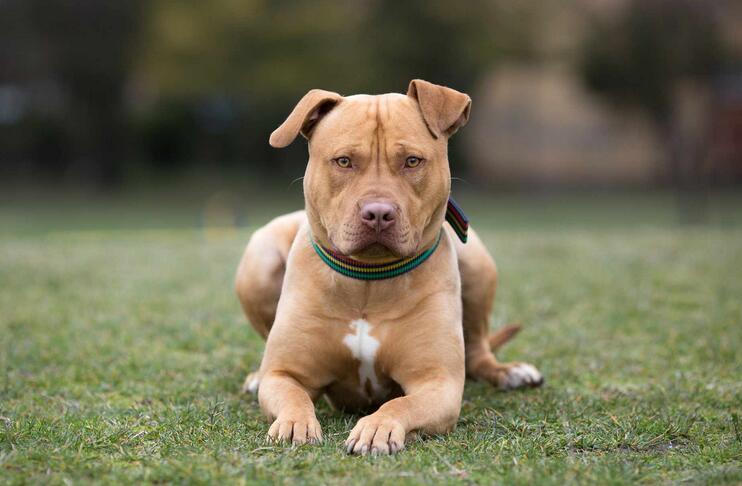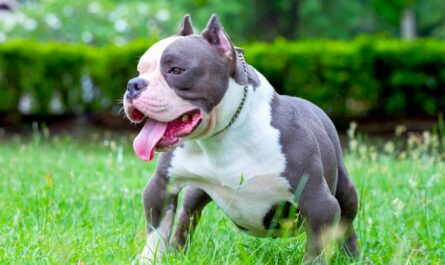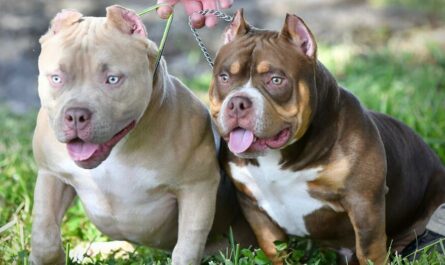Pitbulls are often called the “nanny dogs” due to their affectionate nature towards humans. They are a popular breed of dog known for their loyalty and affectionate nature. As a Pitbull owner or potential owner, it’s essential to understand their lifespan and what factors can influence it. In this article, we will delve into the average lifespan of Pitbulls, the key determinants of their longevity, and how to ensure your furry friend lives a happy and healthy life.
The Lifespan of Pitbulls
The average lifespan of a pitbull is between 10 to 14 years. However, this lifespan can be affected by several factors. For instance, smaller pitbulls tend to live longer than larger pitbulls. Additionally, indoor pitbulls tend to live longer than outdoor pitbulls due to the reduced risk of accidents and exposure to harsh weather conditions.
Breeds and Life Expectancy
It’s important to note that there are different breeds within the Pitbull category. Each of these breeds may have slightly different lifespans and health concerns, so it’s essential to research your specific Pitbull’s breed.
1. American Pit Bull Terrier
The American Pit Bull Terrier is a breed that is known for its loyalty and courage. They are muscular dogs that require regular exercise and a balanced diet to stay healthy. The average lifespan of an American Pit Bull Terrier is between 12 to 14 years. However, with proper care and attention, they can live up to 16 years.
2. Staffordshire Bull Terrier
The Staffordshire Bull Terrier is a breed that is known for its affectionate and loyal nature. They are muscular dogs that require regular exercise and a balanced diet to stay healthy. The average lifespan of a Staffordshire Bull Terrier is between 12 to 14 years. However, with proper care and attention, they can live up to 16 years.
3. American Bulldog
The American Bulldog is a breed that is known for its strength and courage. They require regular exercise and a balanced diet to stay healthy. The average lifespan of an American Bulldog is between 10 to 15 years. However, with proper care and attention, they can live up to 16 years.
4. Bull Terrier
The Bull Terrier is a breed that is known for its playful and affectionate nature. They require regular exercise and a balanced diet to stay healthy. The average lifespan of a Bull Terrier is between 10 to 14 years. However, with proper care and attention, they can live up to 16 years.
5. American Staffordshire Terrier
The American Staffordshire Terrier is a breed that is known for its loyalty and courage. They require regular exercise and a balanced diet to stay healthy. The average lifespan of an American Staffordshire Terrier is between 12 to 14 years. However, with proper care and attention, they can live up to 16 years.
Factors That Impact Pitbull Lifespan
Several factors can impact the lifespan of pitbulls. It’s important for owners to be aware of these factors and take steps to ensure their pitbull lives a long and healthy life.
1. Genetics and Health Issues
Genetics plays a significant role in a pitbull’s lifespan. It’s important to choose a reputable breeder who screens their breeding dogs for genetic health issues.
This can help reduce the risk of inherited conditions that may shorten a pitbull’s lifespan. Additionally, regular veterinary check-ups and proactive health care can help detect and manage any potential health issues early on.
2. Spaying and Neutering
Spaying or neutering your pitbull can have a positive impact on their lifespan. Spayed or neutered pitbulls have a reduced risk of certain reproductive organ-related health issues, such as cancer and infections. It’s important to discuss the appropriate age for spaying or neutering with your veterinarian.
3. Exercise and Diet
Regular exercise and a balanced diet are crucial for a pitbull’s overall health and lifespan. Pitbulls are energetic dogs that require daily physical activity to maintain their physical and mental well-being.
Adequate exercise helps prevent obesity, which can lead to various health problems and shorten a dog’s lifespan.
Additionally, feeding your pitbull a high-quality diet that meets their nutritional needs is essential for their overall health and longevity.
4. Environmental Factors
The environment in which a pitbull lives can also impact their lifespan. Dogs that live primarily outdoors may be more exposed to environmental hazards, such as extreme weather conditions, parasites, and accidents.
On the other hand, dogs that live indoors and are kept in a safe and secure environment are generally at a lower risk of these issues. Providing a safe and comfortable living space for your pitbull can contribute to their overall well-being and lifespan.
5. Veterinary Care and Preventive Measures
Regular veterinary care is essential for ensuring your pitbull’s health and longevity. Routine check-ups, vaccinations, parasite prevention, and dental care are all important aspects of preventive healthcare.
By staying up-to-date with veterinary care, you can address any potential health issues early on and ensure that your pitbull receives the necessary treatments and preventive measures to live a long and healthy life.
6. Love and Attention
Pitbulls are affectionate and social dogs that thrive on love and attention from their owners. Providing a loving and supportive environment for your pitbull can contribute to their overall well-being and happiness.
Spending quality time with your pitbull, engaging in interactive play, and providing mental stimulation are all important for their emotional and mental health. A happy and well-loved pitbull is more likely to live a long and fulfilling life.

Common Health Issues in Pitbulls
Pitbulls are generally healthy dogs, but like any other breed, they are prone to certain health issues. Here are some of the most common health problems that Pitbulls may experience:
1. Hip Dysplasia
Hip dysplasia is a common skeletal disease that affects many breeds of dogs, including Pitbulls. It is characterized by a malformation of the ball and socket of the hip joint, which can lead to pain, lameness, and arthritis. Pitbulls with hip dysplasia may have difficulty standing up, climbing stairs, or walking.
2. Heart Disease
Pitbulls are also prone to heart disease, including aortic stenosis and valve malformations. These conditions can cause heart murmurs, fatigue, and difficulty breathing. If you notice any of these symptoms in your Pitbull, it is important to take them to the vet for a check-up.
3. Cancer
Cancer is a common health issue in Pitbulls, particularly skin cancer. Pitbulls have short hair, which makes them more susceptible to sunburns and skin tumors.
It is important to regularly check your Pitbull’s skin for any lumps or bumps and to take them to the vet if you notice anything unusual.
4. Thyroid Problems
Thyroid problems are another common health issue in Pitbulls. Hypothyroidism, or an underactive thyroid gland, can cause weight gain, lethargy, and skin problems.
Hyperthyroidism, or an overactive thyroid gland, can cause weight loss, restlessness, and increased thirst. If you notice any of these symptoms in your Pitbull, it is important to take them to the vet for a thyroid function test.
5. Arthritis
Arthritis is a common health issue in older Pitbulls. It is characterized by inflammation and joint pain, making it difficult for Pitbulls to move around. Arthritis can be managed with medication, weight management, and gentle exercise.
6. Cataracts
Pitbulls are also prone to cataracts, which is a clouding of the eye’s lens that can cause vision problems. Cataracts can be caused by genetics, trauma, or other health issues.
If you notice that your Pitbull’s eyes are cloudy or if they are having trouble seeing, it is important to take them to the vet for an eye exam.
7. Kidney Disease
Kidney disease is a common health issue in older Pitbulls. It is characterized by a decline in kidney function, which can lead to dehydration, weight loss, and lethargy. Kidney disease can be managed with medication, a special diet, and regular check-ups with the vet.
Tips for Increasing Your Pitbull’s Lifespan
Now that we understand the factors influencing a Pitbull’s lifespan let’s explore some practical tips to ensure your furry friend lives a long and healthy life:
1. Proper Nutrition
Healthy eating is the cornerstone of a long and vibrant life for your Pitbull. Ensure they receive a well-balanced diet with high-quality dog food, lean protein, and essential nutrients. Consult your veterinarian for personalized dietary recommendations.
2. Regular Exercise
Physical activity is crucial to your Pitbull’s overall health. Daily exercise not only keeps them fit but also prevents obesity and related health issues. Engage in activities like daily walks, playtime, and interactive toys to keep them active.
3. Routine Veterinary Care
Regular check-ups and vaccinations are essential to detect and prevent illnesses early. Your vet can guide on vaccinations, flea and tick prevention, and dental care to maintain your Pitbull’s health.
4. Mental Stimulation
Pitbulls are intelligent dogs that thrive on mental challenges. Provide puzzle toys, obedience training, and interactive games to keep their minds engaged and prevent boredom.
5. Weight Management
Maintaining a healthy weight is crucial for your Pitbull’s well-being. Obesity can lead to various health problems. Ensure portion control and consult your vet for weight management strategies.
6. Dental Hygiene
Good oral health is often overlooked but vital for your Pitbull’s overall health. Brush their teeth regularly and offer dental chews or toys to prevent dental issues.
7. Socialization
Pitbulls are social animals that require interaction with other dogs and people. Socialization helps prevent behavioral problems and ensures a happy and balanced life.
8. Adequate Rest
Just like humans, Pitbulls need quality sleep. Provide a comfortable and quiet place for them to rest, ensuring they get enough sleep each day.
9. Quality Time
Building a strong bond with your Pitbull is essential. Spend quality time with them, offering love, attention, and affection to strengthen your relationship.
10. Stress Management
Stress can impact your Pitbull’s health negatively. Avoid stressful situations and provide a safe and secure environment for them to thrive.
Conclusion
In conclusion, the lifespan of your Pitbull depends on various factors, including genetics, diet, exercise, and overall care. Remember that each Pitbull is unique, so tailor your approach to their needs and consult a veterinarian for personalized guidance.
FAQs (Frequently Asked Questions)
1. What is the average lifespan of a Pitbull?
The average lifespan of a Pitbull is typically between 10 to 15 years, but it can vary based on various factors.
2. How can I ensure my Pitbull lives a long and healthy life?
To increase your Pitbull’s lifespan, focus on a balanced diet, regular exercise, veterinary care, socialization, and plenty of love and attention.
3. Is it true that Pitbulls are aggressive dogs?
No, Pitbulls are not inherently aggressive. Their behavior is primarily influenced by their upbringing and socialization. Proper training and a loving environment can result in well-behaved Pitbulls.
4. Can Pitbulls live longer than 15 years?
While 15 years is considered the upper limit of their lifespan, some exceptionally well-cared-for Pitbulls have been known to live beyond that age.





